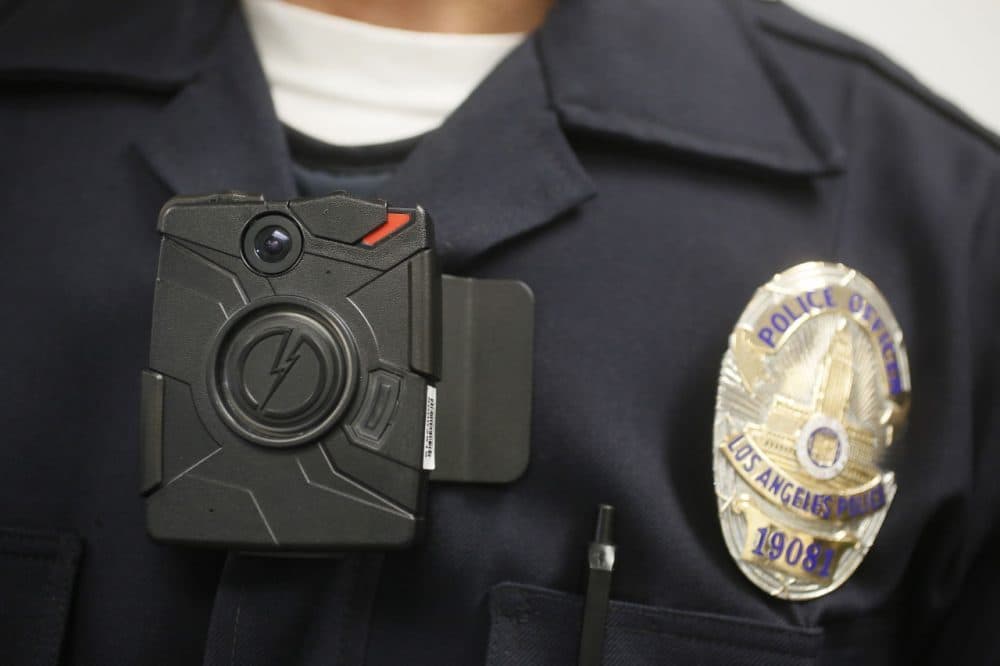Advertisement
Preliminary Boston Police Analysis Finds 'Small Benefits' Of Body Cameras

A preliminary analysis of the Boston Police Department's now-completed body camera pilot program suggests the cameras "may generate small benefits" on police-civilian encounters.
The initial, internal study focused on two factors: citizen complaints and mandatory use of force reports from officers.
"Relative to control officers," the analysis states, "treatment officers [with cameras] received fewer citizen complaints and generated fewer use of force reports."
Specifically, over the yearlong pilot program, there were 12 fewer citizen complaints filed against officers with body-worn cameras, and seven fewer use of force reports, according to the department, compared with officers in a control group.
The analysis, written by Northeastern University researchers for BPD, found the reduction in citizen complaints "small but statistically significant" — 29 complaints for the control group, 17 for the officers with cameras — and the reduction in use of force reports not statistically significant.
The department noted that overall, citizen complaints filed against Boston police have declined by 41 percent over four years, and officers' use of force reports have decreased 54 percent since 2013.
During the 12 months of the pilot program, there were a total of 207 citizen complaints made against BPD officers citywide.
For the pilot, 281 officers across five districts and one plainclothes unit were assigned to wear cameras, or participate as part of control groups.
The pilot ended in September, and a preliminary review was first set to be released in November.
The final analysis of the pilot, due out in June, will consider additional measures, including police productivity and police and community feedback.
Researchers said the preliminary report "should be interpreted with caution."
In a statement, Commissioner William Evans echoed the call for caution.
"Waiting for the results of the full analysis is prudent and necessary to really understanding the context and setting in which body cameras may have the most impact," he said. "It is likely that in the additional analysis the significance of the current findings may become more impactful, but given the Boston Police Department’s historically low numbers, expectations for outcomes should be much more modest."
Evans will make his final recommendations to Mayor Marty Walsh about the use of body cameras after the final report.
Evans also thanked his "officers that utilized this pilot program as an opportunity to showcase the excellent work they have been doing, even if the results may be minimal."
Proponents of body cameras, however, add that the devices are "tools for accountability," providing transparency into certain police interactions.
At the conclusion of the pilot, the group Boston Police Camera Action Team called for the immediate implementation of a permanent body camera program.
"The opportunity that Boston has is to create a program that can be modeled throughout the country," the group's Segun Idowu told WBUR on Wednesday. "We should be talking about, what does a permanent program look like in the city? What policies should be enacted to support the use of these devices."
The pilot was originally slated to last six months, but an agreement in March 2017 between the city and the police union extended the pilot another six months. The union had earlier sought an injunction to halt the pilot program, but a judge in 2016 sided with the city and against the union.
The union has in the past cited research that cameras may cause people to react negatively toward officers. Some studies have found body cameras significantly reduce complaints against police and incidents of police use of force, while other research has concluded that cameras have limited effects.
With additional reporting by WBUR's Newscast Unit
This article was originally published on January 10, 2018.
